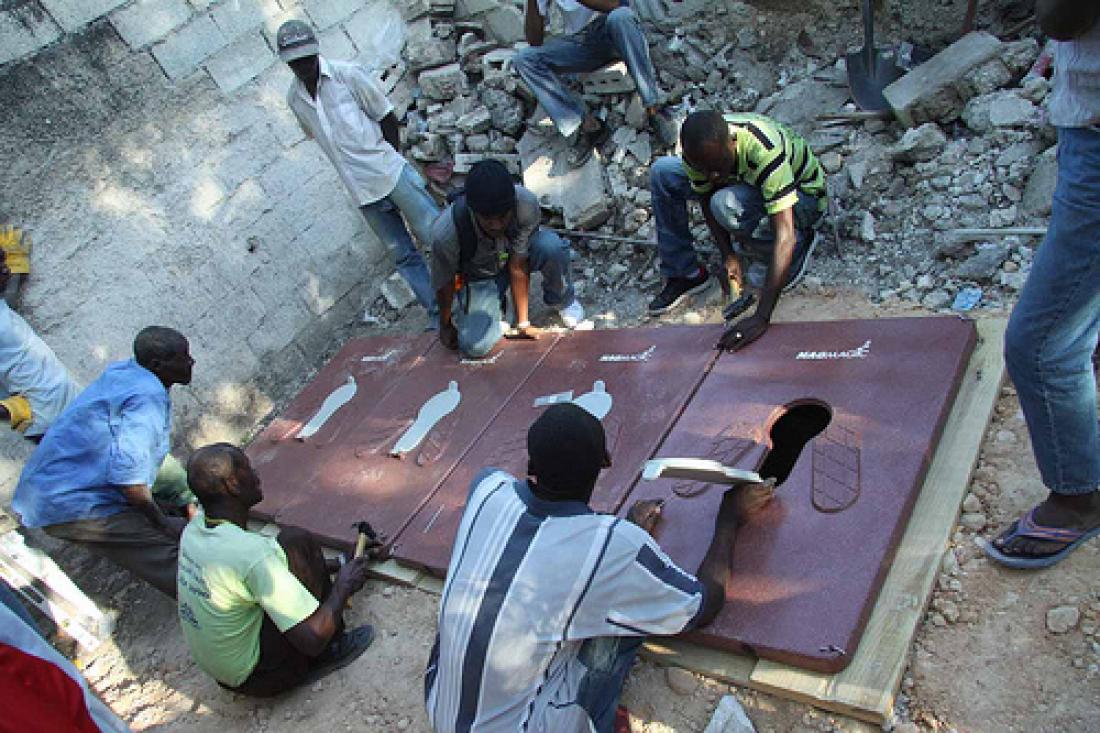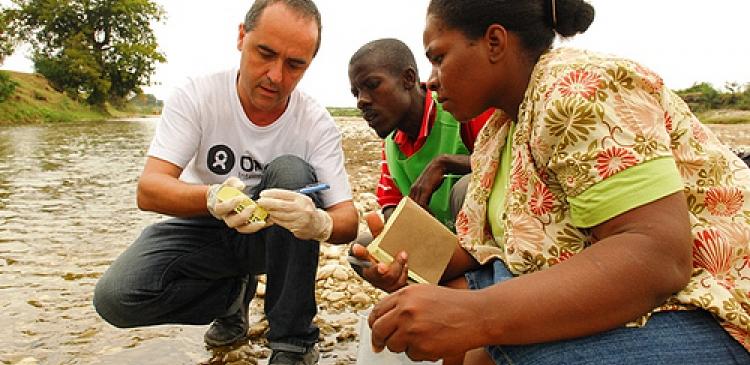Building latrines in Haiti
Spread by water, cholera is an especially high risk disease where thousands are still living in insanitary conditions after the earthquake in January 2010, lacking clean water and exposed to faecal waste.
Drawing on experience from Argentina, where a cholera outbreak occurred in the mid-1990s, a tripartite project is focusing on educating people about the disease, training them in better farming practices and supplying vegetable seeds. Working in close collaboration with the Haiti Ministry of Agriculture, the technical expertise of the Canadian IDRC-funded project is being provided by Pro-Huerta Haiti.
Argentina's experience...
Established in the early 1990s by the Argentine National Institute of Agricultural Technology (INTA), Pro-Huerta promotes community production of fresh food to improve access to a more nutritious and diversified diet. By promoting organic gardens and providing access to both new and indigenous crops that are adapted to the local area, the initiative has increased access to healthy food for the poorest communities. As proof of Pro-Huerta's success in Argentina, the programme now extends to all Argentine provinces and reaches 3.5 million people with the support of more than 16,000 multiplying agents and a network of 8,000 institutions. The model has also been replicated in Brazil, Colombia, Guatemala and Venezuela.
During a cholera outbreak in 1996, Pro-Huerta trained members of their technical team in Argentina on appropriate irrigation management, which was then passed on to farmers through a campaign, In the face of cholera, let's make our farms safe. "Integrating the programme into the health campaign permitted a rapid recuperation of the affected populations, contributing as well to the eradication of cholera," says Miguel Lengyel, director of the Latin American Faculty of Social Sciences (FLACSO) in Argentina. "The campaign had positive returns in terms of safeness of farm production then and thus may well now provide important clues for effective actions to face the cholera epidemic in Haiti."
...applied in Haiti
Plans for information dissemination and training of people involved in the management of Haitian farms in order to improve irrigation practices and food handling, are currently being implemented in Haiti. Water storage facilities and sand filters are also being constructed to safely store water and remove insects, plant material and sediment from water supplies, to avoid the transmission of diseases including cholera.
Established in 2005, Pro-Huerta Haiti's activities precede the recent cholera outbreak. For five years it has been conducting training courses with families, schools, women's organisations, communities and institutions such as orphanages. The focus has been on organic vegetable production, constructing demonstration gardens, distributing vegetable seed, and offering technical assistance to help farmers increase the diversity and availability of fresh produce. Training activities on topics such as soil fertilisation, biological pest control, the production of maize and bean seeds, vegetable garden management in the dry season and the production and consumption of fresh foods have also been held. Over 12 tons of maize seed, 13 tons of bean seed and almost 12,000 kits containing more than 23 varieties of vegetables have been distributed.
Assessing the benefits
To date, the diets of more than 90,000 people have greatly improved through Pro-Huerta Haiti's work, which has recently been expanded through an agreement between Argentina, Canada and Haiti. The earthquake in January 2010 also increased demands for extending the programme to a larger number of families in view of its success in furthering access to a more nutritious and diversified food diet. "The program is a successful example of South-South and South-North-South cooperation for development in Latin America, as well as in other developing countries," says Lengyel.
Seeking to contribute further to this process, IDRC is supporting a number of centres in Latin America to build capacity and cooperation with Haiti. "We need to train new researchers, sustain space for public debate, provide the necessary conditions to coordinate regional agreements, and strengthen international cooperation for development," says Frederico Burone, regional director at IDRC. The development of a policy forum between FLACSO Argentina, INTA and the Haitian National Commission on Food Security to upgrade small farm production in Haiti is one initiative currently underway.
"In addition to better hygiene and water decontamination, good nutrition is a key ally in the battle to stem cholera," Lengyel adds. "Children are often hardest hit by cholera - particularly those from the poorest social sectors - and in Haiti today six out of ten infected by the disease are children. But good nutrition develops and strengthens the immune system."




